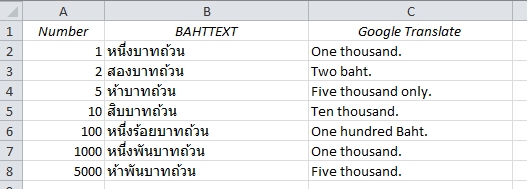Everybody knows that you can do amazing things with Excel, but who would imagine a function like BAHTTEXT? According to Microsoft, this function “Converts a number to Thai text and adds a suffix of Baht.” There are no functions that convert numbers to text in any other language, so why Microsoft chose to develop this function remains a mystery. I’m guessing that one of the developers did it to impress someone who speaks Thai…
Sadly, I don’t speak a word of Thai, so in order to determine whether or not the BAHTTEXT function is good enough to impress anyone, I checked the results in Google Translate. This is what I got:

This doesn’t make sense to me at all! I got the same result for 1 and 1000: “One thousand”. For 5 and 5000 I got almost the same result: “Five thousand only” and “Five thousand”. The results for 2 and 100 look correct, though.
So, who screwed up, Microsoft or Google? Please post a comment below if you can help me understand this!
More oddities in Excel:
Are you using a non-English version of Excel? Click here for translations of the 140 most common functions in 17 different languages:
Catalan
Czech
Danish
Dutch
Finnish
French
Galician
German
Hungarian
Italian
Norwegian
Polish
Portuguese (Brazilian)
Portuguese (European)
Russian
Spanish
Swedish
Turkish
Microsoft’s style is correct. For payment text style in Thai.
1 = One Baht Only
2 = Two Baht Only
5 = Five Baht Only
10 = Ten Baht Only
100 = One Hundred Baht Only
1000 = One Thousand Baht Only
5000 = Five Thousand Baht Only
Thank you Nopbhol! This is definitely the function that returns the best looking result visually, and it’s comforting to hear that it actually makes sense too 🙂
Okay what actually is the point of this.
The “only” (Thai ถ้วน) usage is standard for checks and legal documents, rare/stilted elsewhere. I can’t understand how Google Translate managed to get numbers wrong by a factor of 1,000 but now they’ve fixed that bug—and replaced it with a new one. Instead of “One thousand” you get “One of Baht weighted.” Like the pound sterling, the baht began as a measure of weight in silver. Unfortunately, the baht as a measure of weight now almost always refers to gold — one baht of gold being worth around 20,000 baht. Good one, Google!
Hi, I think your blog might be having browser compatibility issues.
When I look at your blog in Firefox, it looks fine but when opening in Internet Explorer, it has
some overlapping. I just wanted to give you a
quick heads up! Other then that, excellent blog!
Thank you for your kind words and your observation!
Uh… It been 2 years. You might know why or not.
But “ถ้วน” at the end mean it not have dot
but if it have it will be like 1.25
will be One baht twenty five satang
Satang is an old money in Thai
100 satang is 1 baht
but I’m just surprise to see this function is exist. But it useless for me now anyway.
But nice find sir!
Thank you for your nice comment!